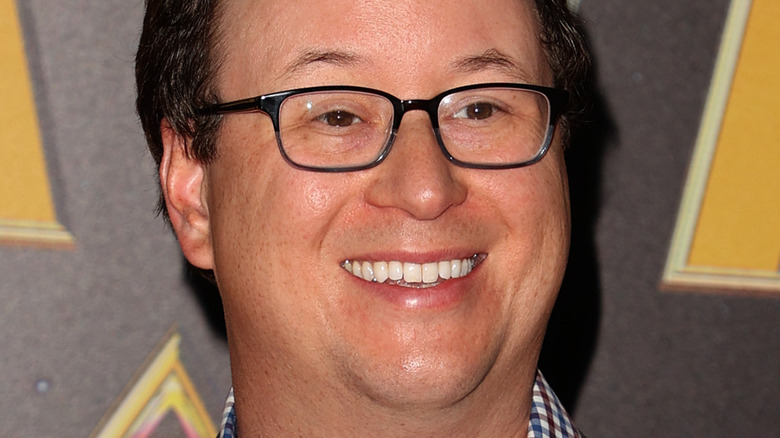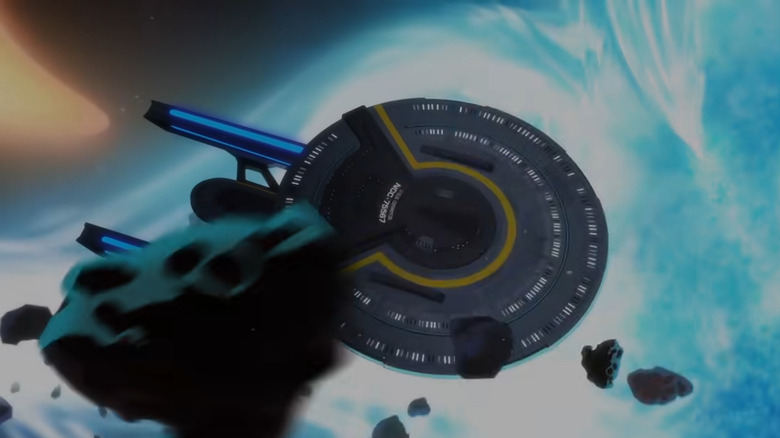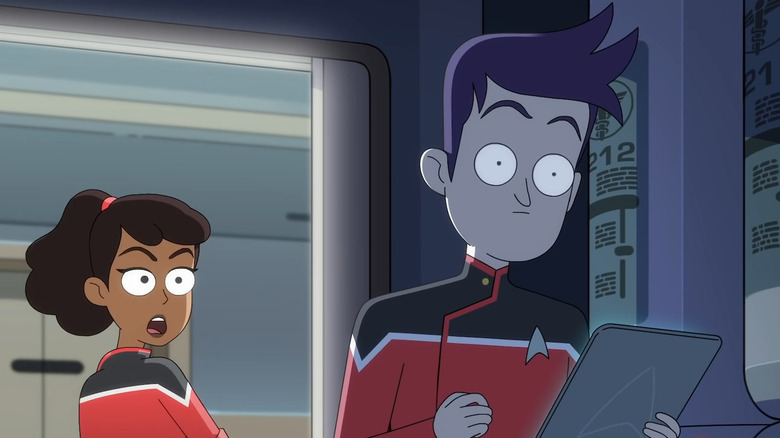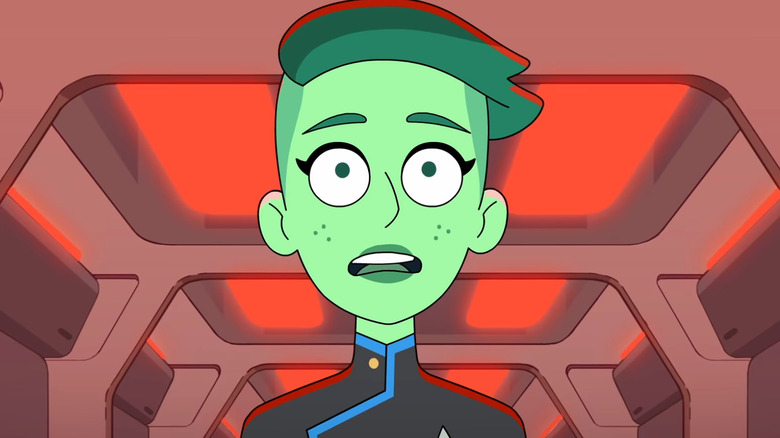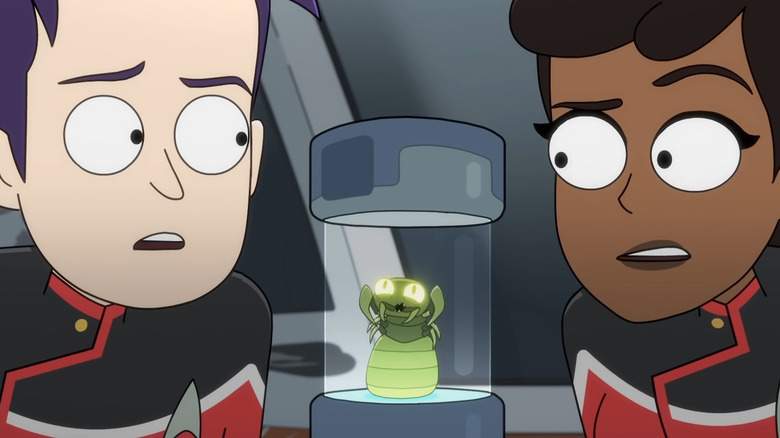Mike McMahan Discusses Upcoming Episodes Of Star Trek: Lower Decks And Solar Opposites - Exclusive Interview
If you like adult-oriented animated comedy from the last few years, there's a very good chance you enjoy the work of Mike McMahan. The writer-producer got his start on "Rick and Morty" and is credited with some of the best episodes of the show's run, including "Something Ricked This Way Comes," "Total Rickall," and "The Rickshank Rickdemption." He even won an Emmy for his work as a supervising producer on "Pickle Rick."
From there, McMahan ventured out on his own, creating the original Hulu series "Solar Opposites" about a family of aliens trying to assimilate to life on Earth. As if that weren't impressive enough, McMahan decided to opt for the sci-fi comedy trifecta by creating "Star Trek: Lower Decks." Hefty sci-fi concepts can be difficult to merge with modern comedic sensibilities, but McMahan has found a way to merge the two concepts effortlessly.
This summer, two major projects from McMahan are coming out — specifically, the Blu-Ray and DVD for "Lower Decks," which contain all kinds of special features, come out on July 12. Meanwhile, "Solar Opposites" Season 3 comes out the following day. McMahan spoke with Looper in an exclusive interview to discuss both projects as well as what fans can expect for the future of both franchises.
What fans can expect from the DVD/Blu-Ray of Lower Decks Season 2
The DVD and Blu-ray for "Lower Decks" Season 2 comes out on July 12. What special features can fans look forward to in the set?
We have some really fun behind-the-scenes stuff showing how we make the show. There's some cool animatics. The artists on the show are so fantastic. Getting to see the process a little bit is exciting if you're a big fan of the show, or if it's something that you're interested in doing creatively. [It's] like seeing the rough version before it's all polished and final.
There's also some fun commentaries on some of the episodes we have. Jonathan Frakes came in — a lot of the cast [did]. Hopefully, those are fun to listen to, because we almost have too much fun recording them because we like goofing on each other.
Did Jonathan Frakes have any good stories from his live-action days in "Star Trek"?
He has so many stories, not only from acting, but from directing, and he directs current "Star Trek" episodes. We love Jonathan. Truly, there's never a time when we're working with him that he isn't making [it] so much more fun than it would've been otherwise.
Is there anything you can tease for "Lower Decks" Season 3?
"Lower Decks" Season 3 is a direct continuation of the end of Season 2. We're going to see what happens to Captain Freeman, and we're going to see how Mariner doesn't handle her mom and captain being arrested very well.
Let me try to think what I can say here. You're going to see some evolution of the characters with different motivations that we teased a little bit at the end of Season 2 as well, like Season 3 sees Boimler taking this different path where he becomes a little bit more confident, our Boimler. It earns him some respect, but it also takes him into some tough spots too.
The last thing is we've been teasing a little bit about Rutherford's implant, and you'll be learning more about the backstory of how he got it this season in a really fun way.
Anything you can tease about Tendi going into Season 3?
She's still at the right. She's got this new gig, which is instead of being full medical, she's been swapped over into senior science officer training, which basically trains you how to be a science officer that serves on the bridge. [It's] not just doing your own studies, but being able to accompany away missions and being able to consult with the captain — like what Spock did. You'll start seeing the beginning of that journey for her as well.
Why the Pakleds were perfect to use for Lower Decks
What was the inspiration behind using the Pakleds to have such a prominent presence on "Lower Decks"?
It was back when there was a lot of news about fascism and strong men rising around the world. Obviously, that's a huge problem. At the time, we had done so many episodes of "Lower Decks" [that] had been inspired by previous "Star Treks," like a trial episode or a big ship action episode and what have you. But what we hadn't done yet is an episode that was directly tied to something that meant something. And "Star Trek" has to mean something for it to be "Star Trek," right? Otherwise, it's just people hanging out on a Starship.
I had been hearing so much. I had been so upset by fascism rising again when it feels like we had taken care of that. It had felt like that was something that everybody agreed was a bad thing. Then you have these people that are bringing it back, and it's almost like the sinister way it comes back is by not shining a light on it or making a joke about it. You don't have to be smart or capable to be fascist.
The Pakleds were this perfect species because they were somebody you would discount. How would they become powerful? The way they become powerful is by everybody ignoring them and not paying attention to them, and they would go around and build up their power. There's a line in the finale about, "They're just a joke." And it's like, well, they're not a joke anymore. They're a real problem again.
Taking that from real life and trying to put it through a lens respectfully in an animated show — that's both funny and "Star Trek" — is what we were trying to do with the pattern.
Ensuring continuity across Star Trek projects
To avoid any incongruities in the "Star Trek" mythology, have you ever been told not to do something with a given storyline or alien race that you wanted to incorporate in your show?
Never. We've never been told, "Don't." If we turn in an outline or a story area that has something that might get close to something one of the other shows is doing, we all jump on the phone and have a conversation. "How are you using this character? How are you using this species? Thematically, what are you saying?"
We don't want people to turn on Paramount+ and start watching the same stories about the same things. Luckily, all the shows have a different tone, different point of view, different era, a lot of the time. We're careful, but we've never been told, "No." We've never been told, "That's off-limits." It's more like, "These guys are doing this, and she's doing that. Is this something you want to do?" It's a conversation of, "Is it different enough? Are we saying something ourselves?" But no, [we've] never been told, "Get out of here. Don't do that."
How often do you have those conversations with the other people affiliated with all the other "Star Trek" shows going on right now?
It comes up a couple times a season, but we also have access to a lot of what they're doing. It's kind of a shared family. I have producers that are reading every script, and we're making sure that everything we're doing isn't repeating stuff. But every once in a while, I'll be like, "Oh, I wonder what they're going to use so-and-so for," and I'll jump on the line with one of the other showrunners and chat it out.
It's fun when we do that. It's a perk of having a "Star Trek" show ... There's been 700-something episodes before we got here. Now we're getting to do it at a time when there's "Star Trek" almost year-round. Part of the fun of it is like, "I'm making the 22-minute animated show, but I'm going to call up the guys making the hour-long, serious drama, and we're going to talk about 'Star Trek' together as equals." That's really cool.
Differences between Lower Decks and Solar Opposites
"Solar Opposites" Season 3 comes out the day following the "Lower Decks" release. Is there anything you're particularly excited for fans to see with the new "Solar Opposites"?
"Solar Opposites" is so different. "Solar Opposites" is funny and silly and doesn't follow any rules, and "Lower Decks" has to follow every rule. It has to be "Star Trek," and it has to be funny, and it has to be character-based. There's never a time on "Solar Opposites" where I'm like, "All right, there's 700-something episodes of a show we can't do."
"Lower Decks" has those complexities, but I use two different kinds of brains. "Solar Opposites" is big and silly and stupid, and "Lower Decks" is funny but also really careful. You want people to come out of it being like, "Wow, that really felt like 'Star Trek.'" I love getting to do both at once because ... It's almost like a mullet. Here's the party in the back, and here's the more thoughtful "Star Trek" thing in the front, but both of them are expressions of the fun that a bunch of writers can have together.
Is there any chance we might see a "Rick and Morty," "Solar Opposites," or "Lower Decks" crossover at some point?
Listen — you show me the lawyer who could figure that one out with all those big companies and give them a big shining medal, and yeah, absolutely. But I don't know. It's tough because it's ... There's comic books I love where it's like "Star Trek" meets "Transformers," or "Star Trek" meets "Planet of the Apes," or "Star Trek" meets "Green Lantern." But that almost feels like it belongs in comics.
There's even a novel of "Star Trek" meets the "X-Men." But once you get that into "Star Trek" on screen, I would never want it to be like, "Oh, wouldn't this be funny?" But it diminishes and breaks some sort of bubble that's there that lets you have the escapism into the world of "Star Trek" that the shows are giving you. So [we'd] probably never really [do a crossover] in the shows, but there's so much expanded material out there. That's where I would love to do that stuff.
"Star Trek: Lower Decks" arrives on Blu-Ray and DVD on July 12 with over an hour of bonus features, including exclusive featurettes, animatics, and Easter eggs.
